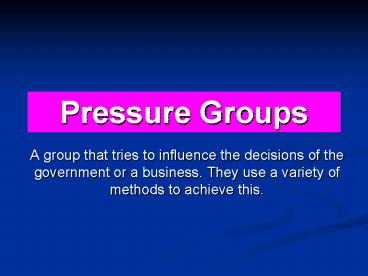Pressure Groups
1 / 14
Title: Pressure Groups
1
Pressure Groups
- A group that tries to influence the decisions of
the government or a business. They use a variety
of methods to achieve this.
2
Pressure Group vs Political Party
- Pressure groups are different from political
parties. Pressure groups do not put forward
candidates in elections. They only have detailed
policies (ideas) in one particular area. - Pressure groups are trying to influence people
who are in power. Political parties want to be
the ones who are in power!
3
There are different types of pressure group
4
(1) Single Cause Pressure Group
examples
Single cause pressure groups focus their
attention on a specific issue.
- Action on Smoking and Health (ASH) Attempt to
reduce smoking. - RSPB Seek to promote care and protection of
birds - London Cycling Campaign Seek to promote use of
bikes in London and the provision of safe cycle
lanes and routes
Go to slide show to be able to use the hyperlinks!
5
(2) Multi-Cause Pressure Group
These pressure groups focus their attention on a
wider range of similar issues.
- Amnesty International campaigns on a wide range
of human rights issues - Friends of the Earth try to influence decision
making on wide range of environmental issues
Go to slide show to be able to use the hyperlinks!
6
(3) Protective Pressure Groups
They campaign to protect the interests of their
members.
- AA they try to influence decisions so that they
will benefit car owners.
Go to slide show to be able to use the hyperlinks!
7
It can get a bit confusing
- Some pressure groups are also charities so
they raise money for certain causes as well as
try to influence the government or businesses. A
good example is Oxfam. They raise money for
people in poverty in the UK and abroad but also
conduct research and campaign for changes to
benefit the poor. One of the ways that they try
to put pressure on the government is by asking
people to write to their MPs about issues.
8
There are 2 different types of action pressure
groups can take
Direct Action
Indirect Action
- Lobbying
- Protest
- Boycotts
- Civil disobedience
- Illegal action
- Publicity
- Petitions
- Providing research
Do you know what these words mean? Go to slide
show and click here if you dont!
9
Illegal Direct Action
- Protest groups can take illegal direct action.
In 2007 animal rights activists planted a bomb in
an Oxford University college to protest against a
new animal testing laboratory.
Back to where you were
10
Examples of Publicity
These images have recently been installed in
London as a way of shocking people into realising
the horrific reality of the sex trade. Pressure
groups sometimes use shock tactics to bring their
issues to the public.
The protest group Fathers 4 Justice have staged
numerous humorous stunts, including scaling the
walls of Buckingham Palace dressed as Batman and
Robin, in order to bring attention to the
difficulties that they say divorced/separated
fathers face when trying to maintain contact with
their children.
Back to where you were
11
Boycotting Nestle
- There has been a longstanding boycott of Nestle
products because of the way that they market
their products in other countries. - This Russian advert suggests that chocolate helps
to boost intelligence by helping children with
hard exam questions.
Another boycott
Back to where you were
12
Boycotting Coke because of the way they treat
workers in other countries
Back to where you were
13
Examples of Civil Disobedience
On the 1st December 1955 Rosa Parks refused to
give up her bus seat to a white passenger as was
required by law. She was arrested but her
actions began a boycott of the buses that lasted
382 days and was one of the most important
moments in the history of the protest against
poor treatment of non-whites in the Southern
states of the USA.
In 2006 Erica Loynes, a 78 year old pensioner
from East Sussex vowed to go to jail rather than
pay her council tax bill which she said was
ridiculous. This example of civil disobedience
has been copied by others who consider their
bills to be excessive.
Back to where you were
14
Definitions
- Lobbying Trying to influence someone to take a
particular action. - Boycott Refusing to buy, use or communicate with
a person or organisation because you disagree
with what they were doing. - Protest Taking action, such as going on a march,
because you disapprove of something. - Civil disobedience Refusing to obey certain laws
because you disagree with them. Civil
disobedience is usually a non-violent way of
protesting.
Back to where you were































